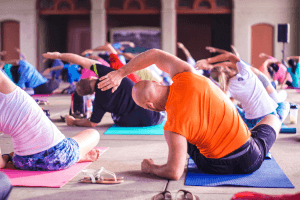In her speech, Lieutenant Governor Kyle Evans Gay emphasizes the importance of trauma-informed care for all Delawareans. She highlights the need...
Wellness Wednesday Tip: Healthy Habits
Welcome to the second Wellness Wednesday in honor of Trauma Awareness Month. We hope these tips provide you with ideas and resources to build your resilience. This week’s tip highlights healthy habits that build protective factors to promote resilience and reduce the development of secondary and vicarious trauma.
Healthy Eating:

- Eat regularly – Aim for three meals a day and try not to skip meals or eat on the run. Your brain needs glucose to work at its best. Blood sugar dips either from not eating or as a rebound after eating something too sweet or starchy; this triggers adrenalin release, and hence stress. Use mealtime to relax, enjoy the flavor of your meal, and reflect on your day.
- Eat protein with every meal and choose slow-releasing carbohydrates – This will help to sustain your energy levels. When chronically stressed the body has an increased demand for protein. Choose lean meat, chicken, fish, eggs, beans, lentils, nuts, and seeds in each meal. Protein helps to slow the release of sugar into the bloodstream. Replace highly refined foods such as white bread, pasta, or sweets with brown bread, rice, oats, and rye.
- Reduce your dependence on stimulants (ie coffee, tea, soda, and energy drinks) – Caffeine causes you to feel “wound up,” which can make stressful situations seem more intense. It leads to increased blood pressure and may make you anxious, especially if you are already prone to anxiety. Rather than giving you energy, these stimulants deplete energy over time, and contribute to blood sugar imbalances. Instead of turning to caffeine, try the natural energy booster – sleep!
- Snack pre-emptively – If you know that a stressful or busy time is approaching, prepare by stocking up on quick, healthy snacks. If you know you have an energy dip before lunch and around 4pm, have a snack mid-morning and again mid-afternoon. Avoid sugar-loaded treats and instead opt for healthy snacks that are high in protein and/or fiber like granola, almonds, peanuts, carrots with hummus, or yogurt with fresh fruit.
- Avoid eating to relieve stress – Try not to reach for food when you are in a stressed state. This can lead to overeating and guilt. Stress diverts blood flow away from your digestive system, which you don’t want when you are trying to digest your food. If this is a problem for you, try to replace eating with other actions that relieve stress, such as taking a walk, playing with a pet, or taking a bath.
Exercise:

- Daily exercise — Except during illness, you should exercise nearly every day
- 30 to 40 minutes of moderate exercise (biking, brisk walking or jogging, swimming or doing water aerobics, playing tennis or racquetball, dancing, or rowing) or 15 to 20 minutes of vigorous exercise
- Aim to walk at least two miles a day or do the equivalent amount of another activity
- You can do it all at once or in 10- to 15-minute chunks if that fits your schedule better
- Add a little strength training and stretching two to three times a week (weight lifting or activities with resistance bands)
- If you need more help with stress, consider autoregulation exercises involving deep breathing or muscular relaxation.
- Everything counts — Any type of exercise can decrease your stress. Something as simple as gardening or choosing to take the stairs rather than the elevator can give you an emotional lift. It’s important to choose an activity that you enjoy rather than dread. If the thought of running makes you anxious, training for a 5K race won’t help relieve your stress. If you don’t like the water, don’t choose swimming as your activity. Try a variety of activities until you find some you enjoy. When you’re having fun, you’ll be more likely to stick with your workout routine.
- Exercise with others — Working out with someone else can also add to the stress-busting benefits of a workout. Sharing it with family members or friends can make exercise feel more like fun and less like work.
Sleep:

- Have a sleep routine — Our bodies operate on a 24-hour internal clock, affecting how it functions, including the way that it regulates temperature and moods. Developing a consistent sleep-wake cycle helps keep the body’s clock regulated. Try waking up at the same time every day, including on weekends and holidays. Set a bedtime that allows for at least 7 hours of sleep every night.
- Avoid certain foods and drinks before bed — Caffeine and nicotine are stimulants that can keep the body awake, so avoid them at least 4–6 hours before bedtime. Alcohol can also negatively affect the quality of sleep. Some substances to avoid are: coffee, tea, soda, chocolate, cigarettes, and certain medications, including some cold, flu, and migraine medications.
- Create an environment that supports sleep — Keeping the bedroom cool can help improve sleep, a temperature of 60–67°F is ideal. Ensure your bedroom is quiet and dark and you are comfortable. Try blackout blinds, wearing an eye mask or earplugs, or white noise. If possible, limit activities in the bedroom to sex and sleeping, to help emphasize the mental association between the bed and sleep.
- Relax before bedtime — Prioritize relaxing activities in the few hours before you go to bed, so you reduce your stress levels and get your body into a calm state ready for sleeping. Creating a relaxing routine to unwind before bed helps signal to the body that it is time for sleep. A relaxing routine might involve listening to calming music, reading something not too stimulating, having a warm bath with Epsom salts and lavender oil, or another gentle activity. Aim to avoid screens, such as on phones and laptops, for at least 1–2 hours before bed. The blue light in these screens can disrupt the production of melatonin, the hormone involved in sleep.
- Get up if not sleeping — If sleep has not come after 20 minutes of trying, get out of bed. Sit somewhere dark and quiet, and do a calming, nonstimulating activity. Once you start to feel drowsy, then you can return to bed.
Job Title: Trauma Informed Care Coordinator Location: Henrietta Johnson Medical Center and Virtual Reports to: Trauma Matters Delaware Board of...
In partnership with Trauma Awareness Month’s emphasis on Belonging and slogan “You Belong,” the board of directors of Trauma Matters Delaware (TMD)...